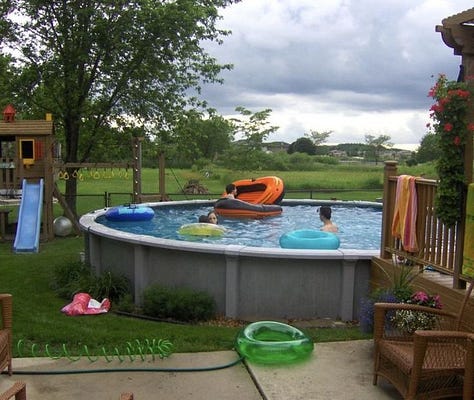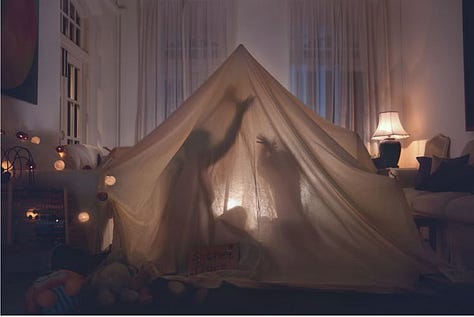I’ve always known that I wanted to have kids. Part of what I’m most excited about is sharing with them what my parents shared with me: different music genres, musical theater, art, literature, and experiences that are so memorable, they don’t need pictures. In fact, in all my wistful dreaming about future things with my supposed future kids, phones are nowhere to be found.



And yet, when looking around at many children, some as young as toddlers, they are glued to screens. These kids are seemingly everywhere: at the grocery store, in restaurants, even at my family gatherings. Tiny hands gripping rectangles, their faces dimly illuminated by flashes of color and light.
I don’t remember my childhood this way. I remember the days stretching long, my feet in the grass, making mud pies with the dirt in my Nonna’s backyard and the water from the hose. I remember blowing bubbles for a half an hour because that was genuinely exciting for that long amount of time. And, most importantly, I remember being bored. I remember the stretches of time where I’d be moaning and groaning to my parents about being bored before eventually picking myself up and finding the solution to cure my boredom.
Boredom is actually super important for our brains. When you have absolutely nothing to do, that’s where creative ideas spark. In Forbes’s “Why Neuroscientists Say, ‘Boredom Is Good For Your Brain’s Health,’” author Bryan Robinson cites neuroscientist Alicia Walf, a researcher in the Department of Cognitive Science at Rensselaer Polytechnic Institute. “Boredom can actually foster creative ideas, refilling your dwindling reservoir, replenishing your work mojo and providing an incubation period for embryonic work ideas to hatch. In those moments that might seem boring, empty and needless, strategies and solutions that have been there all along in some embryonic form are given space and come to life.”1 Speaking from my own experience, some of my best ideas for stories I want to write come when I have nothing going on and my brain roams free.
Being bored is part of the reason that days felt longer too. There are several reasons why time felt longer when we were kids (remember how summer vacation used to feel like it took forever?) and all of it is outlined in this brilliant essay by Yana Yuhai titled, “why time felt slower when we were kids (and how to get it back).” At the end of the piece, Yuhai lists ways to expand time again, and some of the tactics include your brain being bored. For example, “Take a walk without your phone.” Seems like the most simple concept (and, I understand for safety reasons why not everyone can do this), but it really allows your brain to just sit. No music, no podcasts, no phone calls. Nothing to fill the empty silent space while walking. I try to do this as much as possible, and I find it the perfect space for my mind to wander (hee hee, didn’t mean to drop the name of the blog here).
I would want this for my kids. I wouldn’t want my kids’ summer vacations to feel short! I would want to give them space for their imaginations to breathe. I want them to be daydreaming out the car window, singing along to music with me, and asking, “are we there yet?” instead of being checked out, watching a movie or a YouTube unboxing.
And listen, I understand: sometimes parenting is hard, exhausting, and chaotic. Screens offer a quick fix, a pause button, a silencer. But I can’t help wondering what’s being sacrificed in those moments of convenience. And, I don’t say this from a place of moral superiority either. I say it as a person has been sucked into my phone before, and has sacrificed personal writing and reading time for scrolling. I know how addictive and numbing it can be, so why would I willingly hand that over to a child whose brain is still being formed?
I mean, why do we have iPad holders for the back of the passenger seat in your car? Your child isn’t driving in a taxi! And have y’all seen those iPad holders connected to the baby carriers?! What even is that?! It doesn’t look that different from the people in the hoverchairs in Wall-E (seriously, Pixar was onto something).
So, okay, maybe the title of this sounds too idealistic. You might be reading this with a raised eyebrow going, “Really? Never? How do you know since you’ve never been a parent?”
In fact, I remember when I had TikTok seeing Millennial creators get mad at Gen-Z for calling out parents who gave their children technology at a young age. I remember the Millennials saying, “You don’t have kids! You can’t have an opinion on this because you don’t know how hard it is.” Oh, really? Do you still have that opinion after learning that excessive amounts of screen time at young ages can harm and delay cognitive, linguistic, and social-emotional growth?2
Gen-Zers, even older ones like myself, were quick to criticize because it feels like the lazy way out. Why give them an iPad when they could have books to read, coloring pages and sketchbooks, puzzles, board games, volleyballs and tennis rackets, or scooters? Why leave them in front of screens when you could take them on trips to the library, sign them up for sports or instrument lessons, have afternoons at the park or public pool, or have them help you with dinner? Wouldn’t you want to experience these things with your kid?
As far as I’m concerned, the closest my kids are getting to a screen before they’re allowed a phone is playing Just Dance or watching films with me. And if they become bored, all the better.
Thank you for reading this week! Hope you’re taking care of yourself and I appreciate you. <3
- Lillian
Quoted from Forbes’s “Why Neuroscientists Say ‘Boredom is Good For Your Brain’s Health”: https://www.forbes.com/sites/bryanrobinson/2020/09/02/why-neuroscientists-say-boredom-is-good-for-your-brains-health/
From the NIH’s “Effects of Excessive Screen Time on Child Development: An Updated Review and Strategies for Management”: https://pmc.ncbi.nlm.nih.gov/articles/PMC10353947/





love this. i remember my time was filled with arts and crafts with my Nanna, playing tennis, or reading!! it’s so important that kids stimulate their brains with these kinds of activities!
So many great points in this piece!
As someone who worked with toddlers before having kids, I witnessed first hand how screen timed negatively affected their behaviours, and could always tell the “iPad kids” apart from those who had no/limited screen time.
Once having kids I vowed that I wouldn’t have an iPad kid. No screens before 2 and then only the occasional educational show that we would watch together. Never on an iPad, never in public and never used as a distraction.
Sure, it would have been easier sometimes to just give my kids an iPad when they were screaming in the car, or when I needed a break, etc, but I didn’t feel right sacrificing their long term wellbeing in order to do so.
I try not to judge other parents, because I think our society is so screen obsessed, and parenting is hard and they are just trying their best, however I really worry about the long term impact it will have on our society. I’m trying my best to give my kids a more analog life, but it’s challenging when it’s not the norm. It’s about striking a balance for sure.